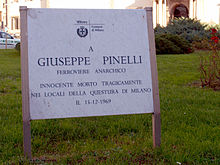Giuseppe Pinelli
You can help expand this article with text translated from the corresponding article in Italian. (January 2021) Click [show] for important translation instructions.
|
Giuseppe Pinelli | |
|---|---|
Italy | |
| Died | December 15, 1969 (aged 41) Milan, Italy |
| Cause of death | Defenestration |
| Nationality | Italian |
| Occupation | Railroad worker |
| Movement | Anarchism |
Giuseppe "Pino" Pinelli (21 October 1928 – 15 December 1969) was an Italian railroad worker and
Early life

Pinelli was born in Milan to Alfredo Pinelli and Rosa Malacarne.[1] His family was working-class in one of the poorest areas of post-World War I Milan. Although he had to work in many low-income jobs, such as waiter and warehouseman,[1] in order to make ends meet, he nonetheless found the time to read many books and become politically active throughout his youth.[1] Among other political activities, he also worked with the anarchist group that published the weekly paper Il Libertario (The Libertarian).[2]
In 1944, Pinelli was a member of the
Suspicious circumstances surrounding his death

On 12 December 1969, a bomb exploded at the
Pinelli's name has since been cleared,
In popular culture
Pinelli's death is the inspiration for
See also
Notes
- ^ The Italian justice uses a system of state witnesses, who are known as pentiti or collaboratori di giustizia (collaborators with justice) to fight against terrorism and the mafia.
References
- ^ a b c d e Finzi, Paolo (December 2005). "Giuseppe 'Pino' Pinelli (1928–1969): the 17th victim of the Piazza Fontana bombing". Sicilia Libertaria. Retrieved 19 April 2024 – via Kate Sharpley Library.
- ^ a b c d e Heath, Nick (9 November 2006). "Pinelli, Giuseppe 'Pino', 1928–1969". Libcom.org. Retrieved 19 April 2024.
- ^ "Giuseppe Pinelli Italian anarchist militant (1928–1969)". Daily Bleed's Anarchist Encyclopedia. 2008. Archived from the original on 25 January 2008 – via Recollection Books.
- ISBN 978-88-9070-609-7.
- ^ a b c "1969: Deadly bomb blasts in Italy". BBC News. 12 December 1969. Retrieved 19 April 2024.
- ^ ISSN 0362-4331. Retrieved 19 April 2024.
- ^ Clark, Martin; Foot, John (20 July 1998). "Italy: Terrorism of Italy". Encyclopædia Britannica Online. Retrieved 17 July 2011. Updated through the years.
{{cite web}}: CS1 maint: postscript (link) - ISSN 1122-1763.
- ^ Fleury, Matthew (1985). "Dario Fo". Bomb Magazine. Archived from the original on 28 August 2017. Retrieved 19 April 2024.
The events upon which the play is based took place in 1969. A bomb exploded in the center of Milan, near the Duomo. Sixteen died. The police blamed the anarchists, one of whom, Giovanni Pinelli, they seized. Later on he was thrown from a window at police headquarters. There is considerable evidence that Pinelli's death was murder, not an accident as the police claimed, so the title Accidental Death of an Anarchist, is ironic. We are sure it was not an accident ... It was murder ... But this is the official police characterization of the event. The case was filed as an 'accidental death'.
- ISSN 2037-089X. Retrieved 19 April 2024.
- ^ Romeo, Ilaria (21 October 2022). "La storia di Giuseppe Pinelli, morto senza verità né giustizia". Collettiva (in Italian). Retrieved 19 April 2024.
- ^ Romeo, Ilaria (15 December 2022). "Il caso Pinelli, storia di un anarchico in cerca di giustizia". Collettiva (in Italian). Retrieved 19 April 2024.
- ^ "Trio get life for 1969 Milan bombing". CNN. 30 June 2001. Archived from the original on 16 January 2007. Retrieved 19 April 2024.
- ^ ISSN 1756-3224. Retrieved 19 April 2024.
- ISSN 1122-1763.
- ISSN 0390-1076. Retrieved 19 April 2024.
- ISSN 2499-0485. Retrieved 19 April 2024.
- ^ "Pasolini in lotta: '12 dicembre'". Cinefilia Ritrovata (in Italian). 1 July 2015. Retrieved 19 April 2024.
- ^ Marcellan, Francesca (12 December 2023). "12 dicembre: la memoria di piazza Fontana e il film 'Romanzo di una strage'". Volere la luna (in Italian). Archived from the original on 13 December 2023. Retrieved 19 April 2024.
- ISBN 978-16-0486-315-4.
- ^ "Giuseppe Pinelli". Centro studi libertari (in Italian). 2020. Retrieved 19 April 2024.
External links
- La ballata del Pinelli [Ballata dell'anarchico Pinelli, o Il feroce questore Guida at Canzoni contro la guerra (in Italian)
- La ballata del Pinelli at Nelvento.net (in Italian)
